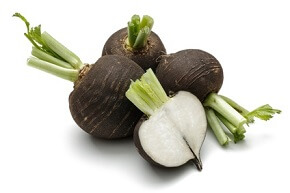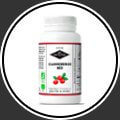Main properties and uses of black radish
Black radish “king of detox” contains many active ingredients beneficial to health. By playing a draining role, it helps the body eliminate toxins by actively acting on the gallbladder, liver and pancreas. Its antioxidant properties also allow it to protect the body against premature aging and to fight against excess cholesterol. What's more, it would have strengthening properties, acting against fatigue and stimulating the immune system. It would also be a good antimicrobial agent.
Main Uses of Black Radish:
- Digestive disorders :

- Hepatic insufficiency :

- Pancreatic insufficiency:

- Detoxification:

Secondary Uses of Black Radish:
- Persistent fatigue:

- Hypercholesterolemia:

- Inflammation of the respiratory tract:

Different forms of using black radish:
Black radish can be consumed in different forms:
- Although the capsule remains the most practical form, black radish is available in other forms.
- Juice: in the morning on an empty stomach and before the evening meal. Can be mixed with the same volume of carrot juice.
- Tincture: dilute in a glass of water.

Black Radish ID Card
- Botanical name:
Rhaphanus sativus var niger - Synonyms:
cultivated horseradish
- Family :
brassicas - Part used:
root
- Harvest time:
November December - Geographic origin :
France
-
Black radish as a drainer and detoxifier:
Drainers are excellent agents for cleansing the body. They stimulate the work of blood filtration and help eliminate toxins through the emunctories of our body. The emunctories are organs whose role is to evacuate waste in order to maintain balance in the body. We find among them: the kidneys, the intestine, the skin, the lungs and the liver. The role of drainers is mainly to clean the emunctories which can then more easily get rid of accumulated toxins. Black radish is recognized by Commission E (an interdisciplinary panel of recognized experts in medicine, toxicology, pharmacology, phytotherapy and pharmacy) for its choleretic effect (promotes the secretion of bile) and cholagogue (facilitates the evacuation of bile towards the intestine). This is why it is often used in the treatment of digestive disorders but also in the treatment of liver disorders because it would help to drain and detoxify the liver. Black radish is therefore ideal for helping the body resume its normal functioning after excess food or alcohol abuse (after the holiday periods for example). It would therefore be recommended as part of a detox treatment and to tone the liver. Rich in water and potassium but also low in sodium, black radish could also have diuretic properties, activating kidney function and promoting the elimination of excess water. -
Black radish as an antimicrobial:
An antimicrobial is a substance that helps stop or slow the spread of microbes such as bacteria, viruses or parasites. Black radish would have antimicrobial properties due to its components including sulforaphane which is capable of inactivating Helicobacter pylori, a bacteria which infects the gastric mucosa and which can be the cause of numerous pathologies including peptic ulcers and increase the risk of gastric cancer. Black radish also contains raphanin, a substance known for its antiseptic and antibacterial effect. It would also be effective against the bacteria Escherichia coli (responsible in particular for gastroenteritis or urinary infections) and would have a beneficial effect in the prevention and treatment of respiratory tract infections.
-
Black radish as an antioxidant:
Free radicals, reactive molecules derived from oxygen, attack our body on a daily basis. They gradually denature the constituents of our body (DNA, cells, proteins, etc.). This phenomenon, called “oxidative stress”, is the main cause of premature aging. It is also involved in a large number of diseases including degenerative pathologies (Alzheimer's, Parkinson's, etc.) or even chronic progressive diseases such as diabetes or cardiovascular diseases. Accentuated by certain factors such as alcohol or tobacco for example, oxidative stress can, conversely, be slowed down by consuming an appropriate quantity of antioxidants in order to help the body defend itself. The antioxidants contained in black radish would limit the oxidation of blood lipids, thus contributing to cardiovascular health, but also of the lipids of intestinal cells, showing a positive effect on the prevention of colon cancer. Black radish is said to have the ability to lower cholesterol and reduce blood levels of cholesterol and triglycerides.

The most interesting synergies based on black radish
In order to optimize the effects of black radish, it is possible, or even recommended, to combine it with other plants, essential oils or natural active ingredients. Here you will find some advice depending on the problem concerned:-
Digestive disorders :

Plants: Plants: turmeric (facilitates digestion and reduces inflammation of the intestines), artichoke (against difficult digestion), ginger (against difficult digestion, nausea)
Essential oils: Essential oils: peppermint (against indigestion, bloating), exotic basil (digestive and antispasmodic), tarragon (antispasmodic and digestive)
Other active ingredients: Other active ingredients: Vegetable charcoal (against bloating, reflux, sourness), brewer's yeast (against diarrhea) -
Liver disorders:

Plants: Plants: artichoke (against liver failure), milk thistle (against liver disorders), desmodium (stimulates hepatic drainage)
Essential oils: Essential oils: lemon (depurative), rosemary verbenone (treatment of liver disorders), carrot (against liver disorders)
Other active ingredients: No specific recommendation. -
Detoxification:

Plants: Plants: desmodium (stimulates hepatic drainage), dandelion (diuretic and depurative), meadowsweet (diuretic and draining), nettle (draining and purifying kidney and skin)
Essential oils: Essential oils: lemon (detoxifying), grapefruit (draining and anti-cellulite)
Other active ingredients: Other active ingredients: pumpkin seed oil (cleansing effect on the liver and colon), aloe vera (detoxifies and purifies the colon)
Precautions for use and contraindications of black radish:
This information is not exhaustive!! Always also consult the instructions on the product packaging as well as the manufacturer's recommendations. If in doubt, consult a health professional.
Black radish is contraindicated for people suffering from bile duct obstruction as it stimulates bile secretion.
Some people may also have a sensitivity to black radish juice which may manifest as gastrointestinal upset or heartburn. Sulfur compounds can, in fact, irritate the digestive system. In this case, it is advisable to reduce the dose or to accompany the treatment with a vegetable oil to relieve these undesirable effects. If the problems persist, it is advisable to turn to another natural treatment.
Black radish is also not recommended for people with hyperthyroidism or thyroid treatment.
- Keep out of reach of young children. Use reserved for adults.
- Not recommended for children, pregnant or breastfeeding women.
- This product cannot replace a varied diet and a healthy lifestyle.
- Do not exceed the recommended daily dose.
Interactions to consider with black radish:
No known interactions.

Black radish and digestive disorders
Nowadays, digestive disorders are a common problem that can arise unexpectedly. They can become very inconvenient, and slow us down in our daily activities. We therefore decided to take stock of the effects of black radish on the digestive system.
WARNING: Black radish cannot in any way replace the advice of a general practitioner.
In view of the traditional use of black radish as well as in vitro tests carried out by scientists, Commission E recognized the effectiveness of black radish juice in the treatment of dyspepsia which is believed to be caused by poor biliary circulation. Dyspepsia generally corresponds to a feeling of discomfort felt in the upper part of the digestive tract (esophagus, stomach) without there being any particular abnormalities in it. It can result in various symptoms such as bloating, discomfort, pain, belching, nausea, etc. These disorders are functional, which means that there is no underlying lesion. They occur frequently and represent one of the main causes of gastroenterology consultations.
A study published in 2002 in the journal Phytotherapy Research evaluated the effects of black radish on the colon lining in rats that were fed a high-fat diet. Digestive disorders caused by this diet were reduced through treatment with black radish extract with an increase in goblet cells, improvement in epithelial cell structure and disappearance of inflammation.
Another study showed that black radish juice helps fight gastric ulcer thanks to its terpenoid and sulfur constituents which would prevent the excess accumulation of free radicals, thus protecting the gastric mucosa. This could be partly linked to the antioxidant properties of black radish. An older study, dating from 1947 and published in the prestigious journal Nature, also showed that this plant would have a protective role against the E.coli bacteria thanks to raphanin which gives it antibacterial properties.
Bibliography of this study: Effects of black radish root (Raphanus sativus L. var niger) on colonic mucosa in rats fed a high-fat diet. P Sipos, K Hagymási et al. Phytotherapy Research. 2002. Herbal remedies for functional dyspepsia and perspective of Iranian traditional medicine. Babaeian M, Naseri M et al. Iranian Red Crescent Med J. 2015 Raphanin, an antibacterial principle of radish (Raphanus sativus). GEORGE IVÁNOVICS, STEPHAN HORVÁTH. Nature. 1947
Black radish and cholesterol
Hypercholesterolemia corresponds to too high a level of cholesterol in the blood: it is the most common hyperlipidemia. It is also a risk factor for cardiovascular diseases. Reducing LDL (bad cholesterol) levels helps reduce the risk of myocardial infarction and stroke. When LDL cholesterol is in excess, it accumulates in the arterial wall, promoting the development of atherosclerotic plaques (fat deposits on the artery walls). Conversely, low HDL cholesterol (good cholesterol) is associated with an increase in vascular risk. High cholesterol can, most often, be prevented or treated. This is why it is important to check your cholesterol levels regularly so that you can take action if necessary.
A 2012 study evaluated the effectiveness of black radish root juice in treating gallstones and reducing blood lipids in mice. After treatment for only 6 days, stones caused by the presence of cholesterol in the bile were successfully eliminated from the gallbladder of mice. What's more, levels of bad cholesterol (LDL) and triglycerides decreased while levels of good cholesterol (HDL) increased. This study could thus confirm the traditional use of black radish.
This effect was discussed in a systemic review published in 2014 by the same researchers who claim that black radish juice helps reduce blood cholesterol levels and dissolve gallstones in mice. This activity is due in particular to glucosinolate molecules derived from black radish which also have antioxidant properties and could reduce hepatic cholesterol levels. Such therapeutic effects could prevent the formation of gallstones due to cholesterol.
Bibliography of this study: Antilithiasic and hypolipidemic effects of Raphanus sativus L. var. niger on mice fed a lithogenic diet. Castro-Torres IG, Naranjo-Rodríguez EB et al. J Biomed Biotechnology. 2012 Raphanus sativus L. var. niger as a source of phytochemicals for the prevention of cholesterol gallstones. Castro-Torres IG, De la O-Arciniega M et al. Phytother Res. 2014
Conclusion and professional opinion:
Black radish is a plant with many medicinal properties. Long recognized as a natural remedy in the treatment of certain digestive disorders (constipation, bloating, nausea, etc.), it has received the attention of a large number of scientists for its draining and detoxifying properties, particularly for the liver. It helps stimulate the secretion of bile and thus participates in the elimination of toxins and waste which accumulate during digestion. It would even be recommended in cases of liver or pancreatic insufficiency. Black radish also has antioxidant properties which help fight excess cholesterol, thus playing a preventive role against cardiovascular diseases. However, studies to date remain somewhat limited and the challenge today remains to carry out extensive clinical trials in order to obtain a better understanding of the effects of this plant on the human body.
The data summarized here is given for information purposes and cannot engage our responsibility.
For further information on use, instructions for use, precautions to take and uses advised against, please refer to the commercial data sheet and label of your products. The food supplements described here are natural plant-based products. However, they are not without danger and without possible interactions with other medications or treatments. It is therefore very important to respect the recommended doses and to tell your doctor or pharmacist that you are taking these products: only he or she will be able to determine if any interactions exist between the food supplement and another treatment or medication that you may be taking.
The pathologies cited in this article are illnesses that can be serious or even life-threatening. A visit to a doctor remains essential. Only he will be able to make a precise diagnosis and, if necessary, provide you with the most appropriate treatment.
Bibliography
- “Guide to plants in phytotherapy classified by need”. http://mycosmetik.fr
- “Nutritional references Black radish”. http://www.aprifel.com
- List of monographs of the German Commission E (phytotherapy). Commission E. 1986
- An open-label pilot study to evaluate the efficacy of Spanish black radish on the induction of phase I and phase II enzymes in healthy male subjects. Evans M, Paterson E, and Barnes DM. BMC Complement Altern Med. 2014
- Antioxidant effect of pressed black radish juice (Raphanus sativus L. var niger) in dietary hyperlipidemia in rats. Lugasi A, Blázovics A et al. Phytother Res. 2005
- Effects of black radish root (Raphanus sativus L. var niger) on colonic mucosa in rats fed a high-fat diet. Sipos P, Hagymasi K et al. Phytother Res. 2002
- Glucoraphasatin: chemistry, occurrence and biological properties. Montaut S, Barillari J, Iori R, Rollin P. Phytochemistry. 2010
- Antilithiasic and hypolipidemic effects of Raphanus sativus L. var. niger on mice fed a lithogenic diet. Castro-Torres IG, Naranjo-Rodríguez EB et al. J Biomed Biotechnology. 2012
- Phytochemical composition and biological activity of 8 varieties of mature radish (Raphanus sativus L.) shoots and taproots. Hanlon PR, Barnes DM. J Food Sci. 2011
- Identification of a novel antibacterial sulfur compound from Raphanus sativus seeds. Jadoun J, Yazbak A et al. Evid-based supplement Alternat Med. 2016
- Antimicrobial efficacy of Raphanus Sativus root juice. Surekha Shukla, Sanjukta Chatterji et al. International Journal of Pharmacy and Pharmaceutical Sciences. 2011
- The diuretic effect in human subjects of a single-day extract of Taraxacum officinale folium. Clare BA, Conroy RS, Spelman K. J Altern Complement Med. 2009
- Pharmacognosy - Phytochemistry, medicinal plants. Bruneton J. 2009
- Effects of black radish root (Raphanus sativus L. var niger) on colonic mucosa in rats fed a high-fat diet. P Sipos, K Hagymási et al. Phytotherapy Research. 2002.
- Herbal remedies for functional dyspepsia and perspective of Iranian traditional medicine. Babaeian M, Naseri M et al. Iranian Red Crescent Med J. 2015
- Raphanine, principe antibacterien du radis (Raphanus sativus). GEORGE IVÁNOVICS, STEPHAN HORVÁTH. By nature 1947
- Antilithiasic and hypolipidemic effects of Raphanus sativus L. var. niger on mice fed a lithogenic diet. Castro-Torres IG, Naranjo-Rodríguez EB et al. J Biomed Biotechnology. 2012
- Raphanus sativus L. var niger as a source of phytochemicals for the prevention of cholesterol gallstones. Castro-Torres IG, De la O-Arciniega M et al. Phytother Res. 2014
NOTE: This article was written by a pharmacist. The data summarized there come from the scientific literature and the references cited above. For medical advice, in the event of specific or prolonged symptoms, please consult your doctor. Only he will be able to make a precise diagnosis and provide you, if necessary, with the most appropriate treatment.
 OUR
OUR